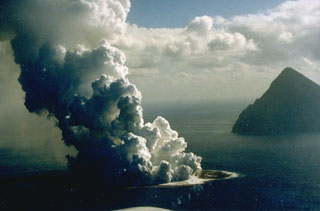Report on Fukutoku-Oka-no-Ba (Japan) — December 1990
Bulletin of the Global Volcanism Network, vol. 15, no. 12 (December 1990)
Managing Editor: Lindsay McClelland.
Fukutoku-Oka-no-Ba (Japan) Frequent observations of discolored water
Please cite this report as:
Global Volcanism Program, 1990. Report on Fukutoku-Oka-no-Ba (Japan) (McClelland, L., ed.). Bulletin of the Global Volcanism Network, 15:12. Smithsonian Institution. https://doi.org/10.5479/si.GVP.BGVN199012-284130
Fukutoku-Oka-no-Ba
Japan
24.285°N, 141.481°E; summit elev. -29 m
All times are local (unless otherwise noted)
Aerial observations of the ocean surface above the submarine volcano revealed discolored water in January-May, September, and November (table 2). The longest discoloration, 8 km, was observed during an overflight on 17 January. Thermal activity has continued since the January 1986 eruption . . . . Discolored water has been frequently observed since that time (14:07). No discolorations were observed at other submarine volcanoes (Kaitoku, Minami-Hiyoshi, Nikko, and Fukujin seamounts) during 1990.
Table 2. Discolored water at Fukutoku-Okanoba, observed from monthly overflights in 1990. Courtesy of JMSA.
| Date | Water Color | Length of Discoloration |
| 17 Jan 1990 | yellowish brown | 8 km |
| 20 Feb 1990 | green | 7 km |
| 27 Mar 1990 | green and brown | 1.8 km |
| 17 Apr 1990 | blue | 0.3 km |
| 16 May 1990 | blue | 0.05 km |
| Jun 1990 | no discoloration | -- |
| Jul 1990 | no discoloration | -- |
| Aug 1990 | no discoloration | -- |
| 13 Sep 1990 | pale green | 3.6 km |
| 15 Oct 1990 | no discoloration | -- |
| 20 Nov 1990 | yellowish green | 0.7 km |
| Dec 1990 | no discoloration | -- |
Geological Summary. Fukutoku-Oka-no-ba is a submarine volcano located 5 km NE of the island of Minami-Ioto. Water discoloration is frequently observed, and several ephemeral islands have formed in the 20th century. The first of these formed Shin-Ioto ("New Sulfur Island") in 1904, and the most recent island was formed in 1986. The volcano is part of an elongated edifice with two major topographic highs trending NNW-SSE, and is a trachyandesitic volcano geochemically similar to Ioto.
Information Contacts: Hydrographic Department, JMSA.

